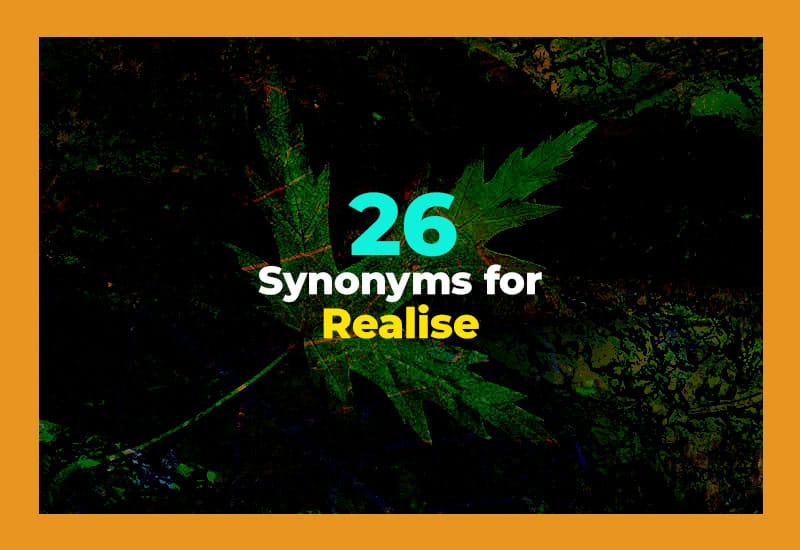You ever have that moment when something just clicks in your brain? Like suddenly, boom — you get it! That's what it means to realise something. But here's the fun part — there are so many other ways to say ‘realise’ that can make your writing or talking sound even better. Let's explore these easy and cool words together, like friends sharing tips over coffee!
1. Understand
To understand something means you get what it means or what is happening. It's like when your teacher explains a math problem and suddenly it makes sense. “I finally understand how to solve this equation” is something you might say after learning. Understanding can be slow or quick, and it can come after thinking for a while. For example, “She didn’t understand why he was upset until he explained everything.” It’s a friendly and simple word that shows the moment when your brain makes a connection. It's one of the easiest and most used synonyms of realise.
2. Discover
Discover means to find out something that you didn't know before. It can be about something small or big. Like, “I discovered that my phone has a hidden feature I never used before.” You can discover things by accident too, not just on purpose. Sometimes people discover truths about themselves. “He discovered he liked painting during the lockdown.” When you discover something, it feels like opening a surprise gift. It's about realising something new or important for the first time, and it usually brings excitement or curiosity.
3. Notice
To notice something means to become aware of it. It might be small or big, but it suddenly grabs your attention. “She noticed a mistake in the homework.” Sometimes you don't realise something right away, but then you look again and boom, you notice it. It's like when you walk into a room and finally see a new picture on the wall. “Did you notice John cut his hair?” This word shows how we come to know or realise things by seeing, hearing, or even feeling them.
4. Recognise
Recognise means you suddenly know something because you've seen or heard it before. Like when you hear a song and “You recognise it from a movie.” You might recognise a person you haven't seen in years. It can also mean you realise a truth. “She recognised her mistake and said sorry.” So, it’s not just about faces or voices — it can be about understanding facts or feelings. This word is warm and thoughtful, and it’s a gentle way to say someone has realised something.
5. Figure out
To figure out means you solve a problem or understand something that was confusing. Like a puzzle, once you put the pieces together, “You figure out what the picture is.” This word is used often when talking about thinking and solving. “He figured out how to fix the printer by watching a video.” It shows effort and brain work. It's a relaxed, everyday way of saying you realised something after some thinking or trying. People use this phrase all the time, especially when they want to sound casual.
6. Grasp
Grasp means to fully understand something, especially an idea or concept. It's like holding it in your mind. “She grasped the meaning of the poem after reading it twice.” It’s used when something might be a little tricky at first. Like “He couldn't grasp the new game rules until someone explained them.” When you grasp something, it stays with you — like your brain grabbed onto it. This word is great for moments when you deeply and clearly realise something.
7. Comprehend
Comprehend is a fancier way to say understand. When you comprehend something, you know it fully. “He couldn't comprehend why she left so suddenly.” This word is often used in school or serious talks. It shows that your mind has taken in something fully and clearly. “She comprehended the story after reading it again.” It's not a word we use in every conversation, but it's strong and helpful when you want to sound thoughtful or show a deep level of realising.
8. Learn
Learn means you gain knowledge or skills. This can be from school, life, or mistakes. “I learned how to cook spaghetti by watching YouTube.” You also learn feelings or truths — like “He learned the value of patience during hard times.” It's one of the best synonyms for realise because it shows growth. When you learn, it means your brain is getting better and wiser. And learning doesn’t stop in school — we do it every day.
9. See
See doesn't only mean using your eyes. It also means to understand something. “Oh, I see what you mean now!” is something people say when they finally realise something. It's a friendly, quick way to show understanding. “She saw that he was unhappy, even though he smiled.” This word is simple and used in daily life. It's great when you want to say you realised something without sounding too serious or complicated.
10. Sense
To sense something means to feel or know it without being told. “I sensed that something was wrong.” It's more about feelings and instincts. You might not have proof, but you feel it in your gut. “He sensed that she wasn't telling the full story.” This word is soft and thoughtful. It's a good way to describe those quiet moments when you realise something without hearing or seeing it clearly.
11. Wake up to
This phrase means you become aware of something, often after ignoring it. “He woke up to the fact that he needed help.” It sounds dramatic and powerful. It's not about actual sleeping — it's about finally realising a truth. “She woke up to how much she had been missing out on.” This phrase shows a strong moment of change or understanding, often after a long time.
12. Be aware
To be aware means you know what's happening around you. “I was aware that someone was watching me.” It also means you understand things, like problems or feelings. “She became aware of her bad habits and started to change.” It's a gentle and polite way to say you realised something. This phrase is used in both daily talk and serious subjects.
13. Get it
'Get it' is a super casual way to say you understand. “Ohhh, now I get it!” It's fun, fast, and friendly. People say it when they suddenly realise something. “He didn't get the joke at first, but later he laughed.” This phrase is perfect in conversation and feels natural when something clicks in your brain. It's like a light turning on.
14. Catch on
Catch on means you slowly begin to understand something. “It took a while, but he caught on to how the machine works.” This phrase is easy and playful. You don't need to be super smart to catch on — just keep trying and stay curious. “She caught on to the game rules quickly.” It shows that you realised something after paying attention.
15. Deduce
Deduce is a smart-sounding word that means you figured something out by thinking carefully. “He deduced that someone had been in his room.” It's used when you realise something based on clues. Like a detective! “She deduced that the gift was from her brother because of the handwriting.” It's a great word when you want to sound clever and logical.
16. Identify
Identify means you figure out exactly what something is. “She identified the problem with the car engine.” It can also mean you realised something clearly. “He identified his feelings as jealousy.” This word shows strong and clear thinking. It's helpful in situations where you want to explain that you've realised something and know exactly what it is.
17. Observe
Observe means to watch carefully and realise things through watching. “She observed that he was tired even though he smiled.” It's a word used by scientists, but also in everyday life. “He observed that the traffic was heavier on Mondays.” It's a smart and calm word that shows quiet realising by watching and thinking.
18. Detect
Detect means to find out something hidden or not easy to see. “The dog detected the smell of food.” It can also mean realising a truth. “She detected a change in his tone.” This word feels a little serious or secretive, like a mystery being solved. It's used when you realise something that others might miss.
19. Perceive
Perceive is about how you see or understand something. “He perceived her silence as anger.” It's a deep and thoughtful word. It means you realised something based on what you saw or felt. “She perceived that the situation was not safe.” It's often used in books or serious talks.
20. Conclude
To conclude means to come to a decision or understanding after thinking. “She concluded that he was right all along.” It's usually used when you've looked at facts or thoughts. “After reading the signs, he concluded that the road was closed.” This word is like the final step in realising something.
21. Realise
Of course, we can't forget the word itself! To realise means you suddenly understand something. “I realised I left my keys at home.” It can be about a mistake, a truth, or a feeling. “She realised she loved him.” It's a beautiful and simple word that shows your mind finally saw something clearly.
22. Note
Note means to pay attention and realise something. “She noted the sadness in his voice.” It's a quiet and smart word. You can note something in writing or in your mind. “He noted the changes in her behavior.” It's often used in thoughtful or careful situations.
23. Be conscious of
This phrase means you are clearly aware of something. “He was conscious of people watching him.” It's about knowing what's happening, inside or outside. “She became conscious of her own fears.” It's formal, but still friendly when used right.
24. Wake up
Different from sleeping, this phrase also means to realise something clearly. “He woke up to the truth.” It shows a moment when something becomes obvious to you. “She woke up and saw the real problem.” It feels strong and emotional.
25. Pick up on
To pick up on something means you noticed or understood it. “She picked up on his mood change.” It's like realising something quietly. “He picked up on the hint she gave.” It's casual and common.
26. Acknowledge
Acknowledge means you accept or admit something is true. “She acknowledged her mistake.” It's more than just realising — it's accepting. “He acknowledged that he was wrong.” This word is honest and respectful.

I hope you enjoyed this fun and simple list of synonyms for ‘realise’. These words can help you sound clearer, smarter, and even more natural when you talk or write. Whether you’re texting a friend or working on a school project, now you have so many choices to express yourself better. Keep using them and watch how your communication improves day by day!









